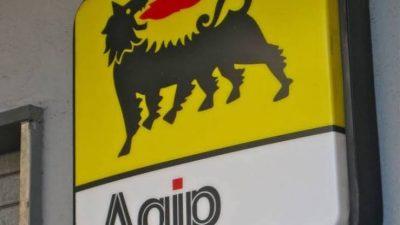Nigeria To Lose N1.2bn Daily Over Agip Oil Export Cut
Nigeria’s energy crisis on Monday took a multiple dimension as Agip announced a halt in oil export at its 25,000 barrels per day (bpd) Brass export terminal in Bayelsa.
This was sequel to a blast at its facility, which could trigger a $2.84 million (about N1.2 billion) daily oil export loss.
Nigeria has been battling with activities of oil vandals who have been using advanced technology to blow up oil installations.
Most of the recent setbacks have been attributed to them amid increased oil spillage and environmental degradation.
Such activities have made it difficult for Nigeria to meet its OPEC quota and by extension lose billions of dollars at a period of rising oil prices in the international market.
The announcement of the destruction came when the national electricity grid crashed to zero from a 2,700 megawatts (MW) level around 11am, amidst an emergency meeting between the Minister of Power, Engr. Abubakar D. Aliyu and power firm operators on how to resolve the problem.
According to the Nigerian Agip Oil Company (NAOC) in a statement, the force majeure was declared on oil exports of 25,000 bpd from its Brass terminal and gas feeds to the Nigeria Liquefied Natural Gas at Bonny after a blast at its facility in Nembe LGA of Bayelsa State that cut oil export from its Brass export terminal.
The force majeure also affects the gas supplies to the Okpai Power Plant.
At the price of at least $113.4 per barrel of Bonny Light on Monday, Daily Trust reports that Nigeria’s loss from crude oil exports could amount to $2.84m daily and may continue until the damaged facilities are repaired.
The incident was the second attack in a few days after an earlier incident on February 28 at its Obama flow station led to a production shortfall of 5,000 barrels per day, the oil company said.
Gas output of 13 million standard cubic metres per day has been deferred due to the incident, the statement said.
Force majeure is a legal clause in contracts that absolves firms from legal liabilities due to circumstances beyond their control.
The company said, “An incident occurred on the Ogoda/Brass 24” oil line, at Okparatubo in Nembe LGA of Bayelsa State.
“The event was caused by a blast, consequently causing a spill. All wells connected to that pipeline were immediately shut-in whilst river booms and containment barges were mobilised to reduce the impact of the spill.
“Regulators for inspection visit and repair teams have also been activated. State and federal government and security authorities were notified.
“Deferred production is estimated at 25 kbopd oil and about 13 MSCM/d of gas.
“Force majeure has been declared at Brass terminal, Bonny NLNG and Okpai Power Plant,” Eni (Agip) stated.
The National Oil Spills Detection and Response Agency (NOSDRA) confirmed that joint investigative visits on the two incidents have been conducted but that the field officers assigned were yet to file their reports.
The Director-General of NOSDRA, Mr Idris Musa, said the two incidents were traced to vandalisation, adding that 20 barrels leaked in the Feb 28 incident, while 1,249.8 barrels were discharged into the environment in the second incident.
Communities lament degradation
Meanwhile, residents at the predominantly fishing settlements who operate in the creeks and near the Atlantic shoreline at Nembe and Brass in Bayelsa have lamented the adverse impact of frequent spills in the area.
Mr Noel Ikonikumo, Chairman, United Fishing Union, Sangana, listed the oil spills to include the November 5, 2021, well blowout from Aiteo’s field in Nembe and a gas leakage at Conoil’s field at Sangana in Brass LGA also in Nov 2022.
He said barely three months after the Nov 5, 2021 incident from Aiteo’s field, another leak occurred in February, while two other incidents occurred near Ship’s Obama Flow station in Nembe, which cumulatively polluted the waters they fish in.
Energy expert, Mahmud Sani lamented that Nigeria has failed to get it right decades after the discovery of the oil treasure.
“The development in the Niger Delta region is sad because oil bunkering is one of the reasons for the persistent crisis in the industry.
“The amnesty programme has solved some problems but it did not put an end to organised thievery. High profile individuals are involved in bunkering and the government must find a way of tackling them,” he said.


